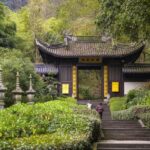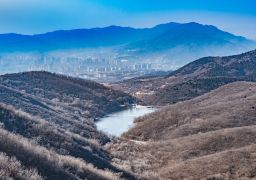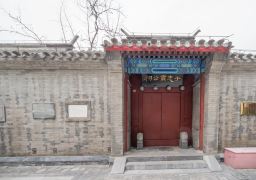Guiyun Cave, nestled on the eastern slope of Gai Cang Mountain (Tea Mountain), is positioned halfway up Xiaodan Mountain within Maoxian Village, Huchen Township, Ninghai County, Zhejiang. This remarkable cave measures 16 meters in height and 12 meters in depth. During the spring and summer seasons, the cave’s entrance is frequently enveloped in clouds and mist, which is the source of its poetic name, ‘Guiyun Cave’. A verse encapsulates its charm: ‘The rivers and mountains of the Song dynasty are distant and vague, while outside Guiyun Cave the water flows leisurely. Where are the traces of the ancients now, as the evening sun sets on the ancient road in autumn.’
Historically, Guiyun Cave has been a place of inspiration and contemplation for renowned scholars. Figures such as Hu Sanxing and Shu Yueyang from the Song Dynasty, and the Ming Dynasty scholar Fang Xiaoru, have all journeyed to this site to appreciate its beauty. Additionally, Pan Tianshou, a master of traditional Chinese painting, has also explored and admired the cave’s natural splendor.
The cave is accessible year-round and remains open to visitors 24 hours a day, offering a constant opportunity to experience its timeless allure.









